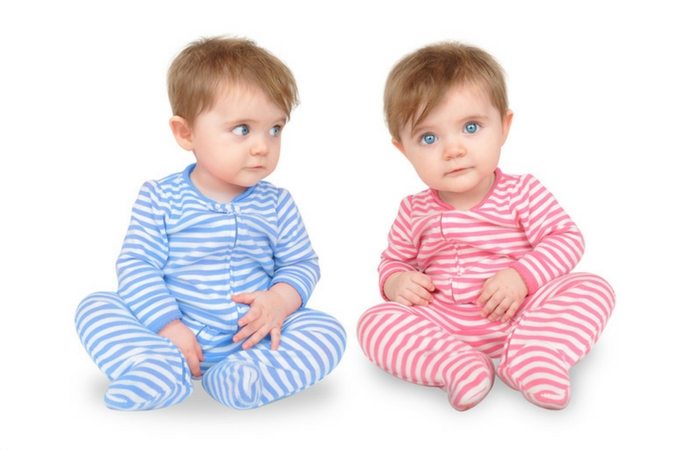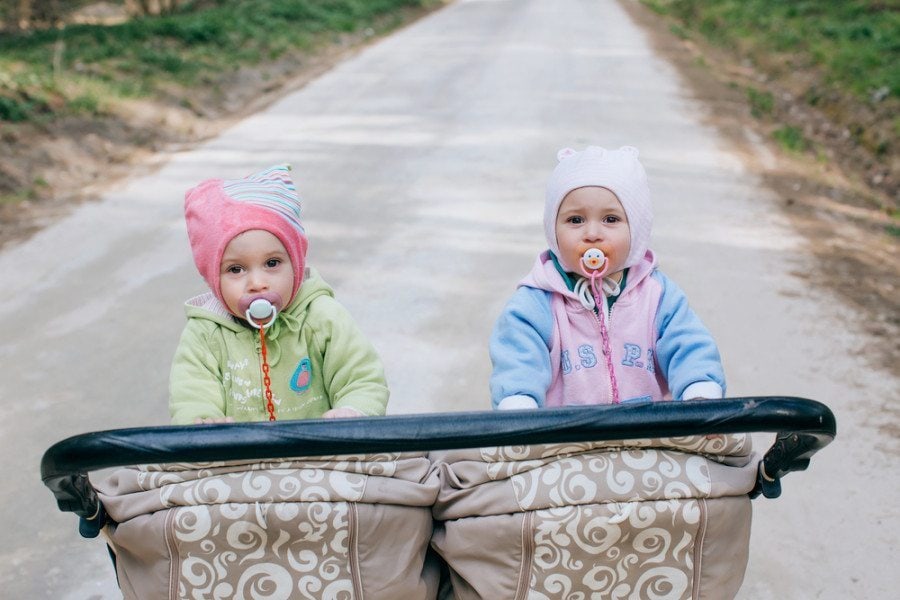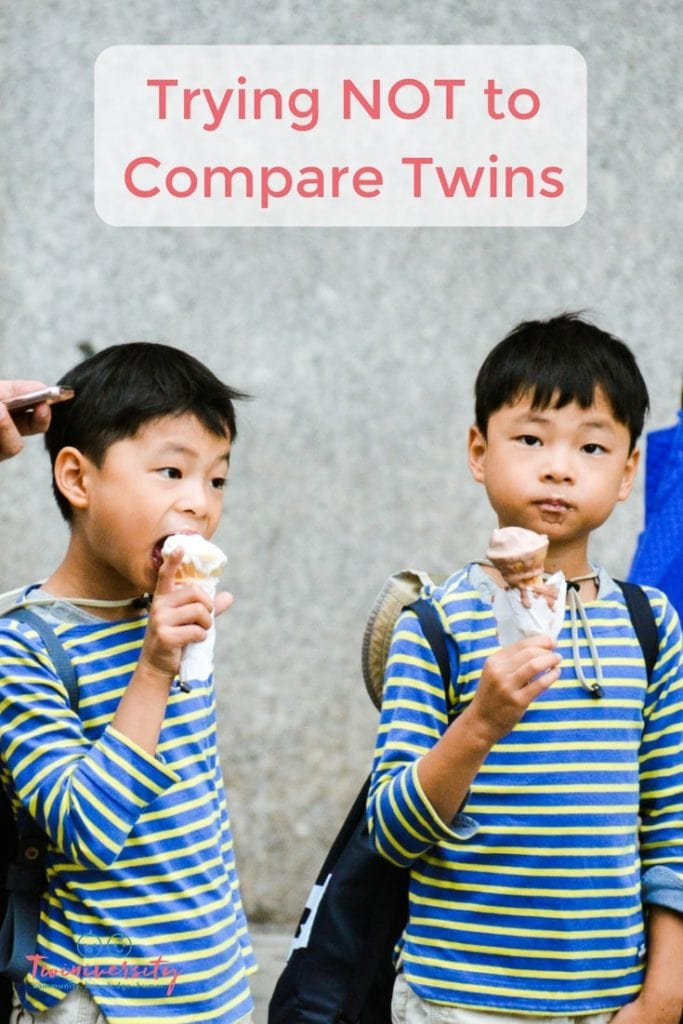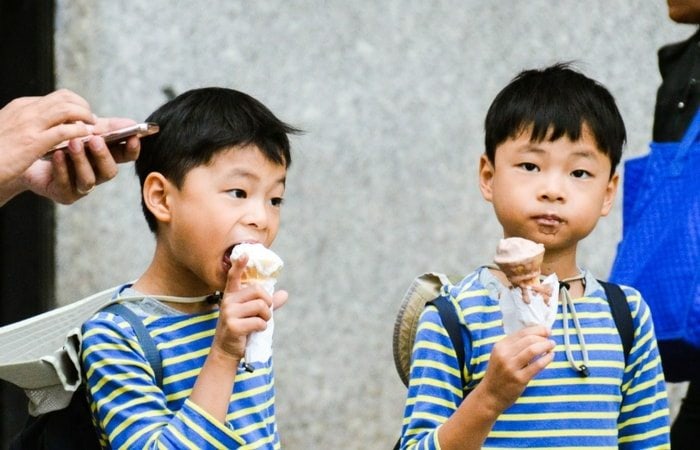Last updated on September 28th, 2021 at 01:56 pm
A few months ago, after some encouragement from our pediatrician and other twin parents, we decided to have our twin boys DNA tested and found out that they were identical. Honestly, the main reason we wanted to have this information was to satisfy our own curiosity, but it’s been helpful when going through certain developmental changes and milestones.
My boys popped their first two teeth within a few days of one another. They also lost their hair (and then gained it back) at the same rate. They are moving up the height and weight growth charts at pretty much the same speed too. When my first little one rolled over confidently at 4 months, I figured his brother was just a couple days away. You can imagine my surprise (and to be honest, confusion) when his twin didn’t roll over for nearly two more months? It was at this point that I realized I had two individuals on my hands, and I would have to remind myself of that fact each and every day and try no to compare them.

As a former teacher, I have trained myself to look at every child as an individual. Every student that entered my preschool or kindergarten classroom had his or her own sets of strengths and challenges. They also had a unique personality, which would shine through brightly by the end of our first week together. I could recite the ways I assessed my individual students and looked for these differing qualities in my sleep. Funny thing…when you have your own children, it doesn’t matter how you were trained. Your brain insists that you compare them. Each younger sibling gets compared to the older brothers and sisters in the household. If you have twins, the comparisons start from day one. And if it’s identical twins watch out.
I noticed within hours of having the boys that I was referring to them as ‘the boys,’ ‘the twins,’ or ‘the babies.’ Slowly they were already losing the individuality that I had promised myself to uphold. I started dressing them differently from day one, and kept their hospital bands on to ensure that we did not mix them up. However, once we got home, I realized that, for my own sanity, I had to keep them on the same schedule. To me, this meant they would have the same access to food, tummy time, and snuggles.
At the beginning, I felt like we were being identical parents to our identical twins. I knew this wouldn’t last, especially since my mantra as a parent coach is ‘Parent the child you have, not the one you think you want to have.’ As we neared the 3 and 4 month mark, when their personalities started coming through bit by bit, it was clear that we had two separate children on our hands.

Now, at 8 months, they have met many developmental milestones, and it’s becoming impossible to not compare them. Twin A has always been more verbal while Twin B is our mover. Twin B started crawling and sitting steadily at 6 months, while it took Twin A an extra month before he was sitting confidently. He still hasn’t started crawling consistently and likes to lay on his tummy trying to convince us he is moving with a huge grin on his face. Twin A has been chatting up a storm, while Twin B only shows off his verbal skills when he’s frustrated or over-stimulated. Since they are identical, they continue to move up the growth charts at the same pace and have continued getting teeth at the same rate. This helps remind me that certain things will always be the same, while others will follow completely different trajectories.
Raising my boys has been a real eye opener (in many, MANY ways). After spending years with children, I have finally come to the realization that making these comparisons may not be such a bad thing. When we visit the doctor, and she plots their height and weight, that is a comparison to other ‘same-age’ peers. When I google “Why is my 8-month-old doing _____?” I am looking for similar stories to remind me that his behavior is typical. It is actually within these comparisons that I have been able to identify my boys unique strengths and personalities and I am quickly becoming grateful for each of these differences.
The comparisons have also helped our friends and family identify each of the twins. When people walk into our house, they look at the boys, wait a minute, then quickly say hi to Twin B as he inchworm crawls his way over to say hello. They love to see Twin A’s never-ending smiles and listen to him babble as he chews on his teething toys. The differences I see better define my boys to everyone around them. Once I wrapped my head around this concept, I started appreciating the fact that they don’t do everything at the same time. These comparisons will only become a negative attribute of parenting, if we allow them to consume us with worry and concern.

One day, when my boys are older, they will ask about stories from when they were babies (at least I hope they do!). I will be so excited to share the stories about things that we take for granted in these early stages. I will laugh with Twin B as we talk about how he likes to crawl the perimeter of every room multiple times a day looking for something new each time. Twin A and I will giggle about the ‘swimming’ motion he makes as he attempts to crawl, only to end up in the same place smiling with his big toothy grin. I will also feel so fortunate that I have ways to describe them as individuals, because I know that so often my boys will be defined as a pair.
 Abby Ludwig is a mom to twin boys and lives in the Chicagoland area with her husband. She has quickly mastered running every appliance in the house to try and make sure everyone is fed, clothed, and clean. As a former Kindergarten teacher, she loves to keep things organized and has recently found how cathartic it can be to fold teeny tiny laundry into nice neat piles. While everything may look nice on the outside, Abby promises she’s really a ‘fake it til you make it’ kind of mom who loves her little men something fierce!
Abby Ludwig is a mom to twin boys and lives in the Chicagoland area with her husband. She has quickly mastered running every appliance in the house to try and make sure everyone is fed, clothed, and clean. As a former Kindergarten teacher, she loves to keep things organized and has recently found how cathartic it can be to fold teeny tiny laundry into nice neat piles. While everything may look nice on the outside, Abby promises she’s really a ‘fake it til you make it’ kind of mom who loves her little men something fierce!
Related Articles
7 Misconceptions About Identical Twins







